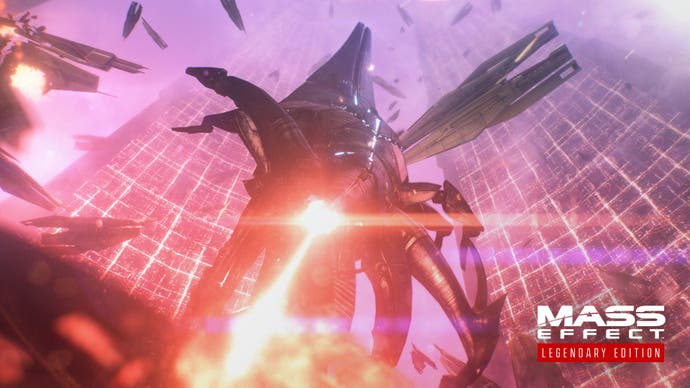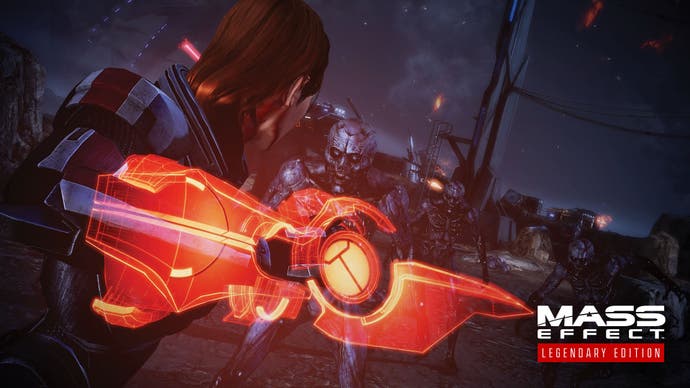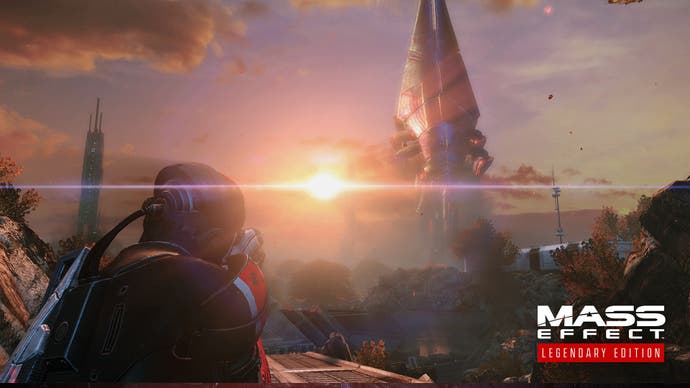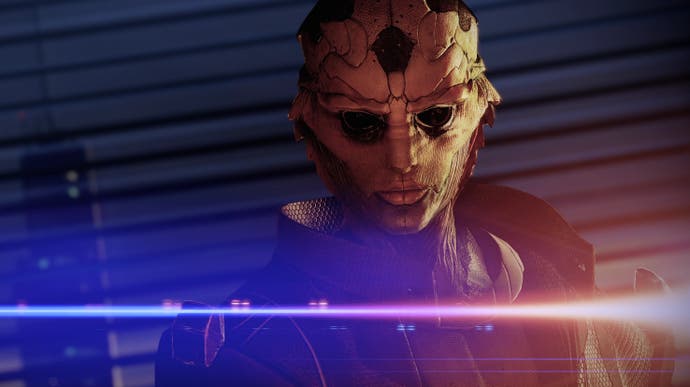Mass Effect returns: BioWare talks trilogy tweaks and franchise revival
Legendary Edition due May, extensive ME1 work revealed.
Mass Effect's back. The Legendary Edition of BioWare's beloved trilogy launches on 14th May and Shepard's aging space adventures have never looked better. We have plenty of detail on all the upgrades this remaster brings to Mass Effect 1, 2 and 3 below.
But, of course, there's more to this impending revival than all that. Sitting down with BioWare to discuss the changes and look to the future, the fact Mass Effect is back on the schedule at all seems like something worth celebrating, considering where the franchise seemed to have been left a few years ago. For fans, there's been an anxious wait for news on whether Mass Effect would continue, until the twin announcements late last year - of the remastered trilogy and a brand new (still very far-off) continuation of the series - let fans once again breathe easy. We talk to BioWare about all that below as well.
First, some specifics. The Mass Effect trilogy's Legendary Edition includes 4K support and HDR compatibility, plus 60 FPS on PC and consoles from PS4 Pro/Xbox One Series X forwards. On PC, it adds support for controllers and 21:9 widescreen displays. As expected, all three games and all single-player DLCs are included. There's no multiplayer mode, no additional story elements, and no version (yet) for Nintendo Switch.
Mass Effect 1, by far the most dated-looking of the trilogy, has undergone a particularly extensive rework, with dramatic improvements to some of its environments. The results on planets such as Eden Prime, Ilos and Feros look on first impression far closer to a full remake. ME1 has also seen other tweaks, including fan-requested improvements to the Mako vehicle's often wildly-erratic driving experience, various combat changes and much faster Citadel lifts (thank goodness).
Differences across the whole trilogy include remastered character models, an expanded universal character creator and the option to use ME3's default female Shepard model throughout. There are noticeable improvements to Shepard's range of available skin tones, hairstyles and makeup options, for a more diverse range of possibilities. Overall, BioWare says there are "tens of thousands" of updated textures, shaders, visual effects and lighting changes, plus a new bokeh-style depth of field.
Work on the Legendary Edition began in early 2019, when a small team within BioWare finally got the green light. There had been tentative talks within the studio for half a decade to get a trilogy remaster off the ground - some of which got further than others - but it was the return of studio boss Casey Hudson, a Mass Effect veteran, who finally pushed the project into being.
"Are we going to do it?', 'how about now?'"
"I was probably in half a dozen meetings over probably almost as many years asking 'are we going to do it?', 'how about now?'," recalls Mac Walters, Mass Effect's long-time writer, producer and now project director of the Legendary Edition. "If anything, I would say having Casey Hudson back in the studio at the time, he was obviously very passionate about the trilogy for obvious reasons and he was very supportive of it. I think that really helped get it over that initial inertia, [where you just] need to kind of get something moving and then you're doing it. And it just seemed to click this time and away we went."
Where to start with such an enormous project? BioWare quickly decided against creating new content or adding anything back in previously left on the cutting room floor in order to preserve the experience people remember. The studio also discussed with Epic Games the possibility of moving the entire trilogy onto Unreal Engine 4, though discarded that idea after realising many of the game's systems would no longer be compatible. Walters compared the project's early months of work to starting restoration on a classic car - then discovering "that car was buried in cement, and every time you tried to dig it out you were worried about dinging the paint or ripping off a mirror".

By the spring of 2020, work on the Legendary Edition was at a "baseline" state where everything worked and BioWare's first round of improvements were in. Mass Effect's famous cast of characters had been a particular focus, with improvements to models, eye shaders and lighting, alongside new visual techniques such as tone-mapping, ambient occlusion and subsurface scattering. The team had spent time discussing the need to keep improvements to character designs consistent across the trilogy, though also reflect the changes each character goes through. A look at an updated model for ME1's Liara, for example, shows her doe-eyedness tuned down a notch, a change which better reflects the direction of her character arc and model across the three games.
The Legendary Edition was also now content complete, with a new single launcher to wrap all three games in one, plus all respective DLCs and other items unlocked. It's worth taking a moment to note the list of included additions here is nothing less than the full single-player package, from simple mission packs to full-blown expansions like Lair of the Shadow Broker, from individual promotional weapons to squadmate costume packs and collector's edition bonuses. If it's relevant at all to the trilogy's single-player, it's included (with one small exception) . Even the catch-up Genesis comics are there.
Gameplay changes to ME2 and ME3 sound relatively minimal, though there's a whole list of differences to remove "friction" from ME1. Aim assist adds adhesion to keep you locked onto enemies, while a "zoom snap" will flick your focus onto a target when aiming. Each ME1 gun has been balanced and given an individual feel similar to those found in later games. The Mako has been given a speed boost and updated physics, while the game's hidden loading screens in lifts have been drastically cut down in length. Comparison footage of a ride up to the Citadel's Presidium level lasts just 14 seconds in the Legendary Edition, down from 52 seconds in the original.

But even with the baseline changes across the trilogy, it seems clear Mass Effect 1 still lagged behind the visuals of the other two games. Did its levels need a full remake instead, in order to live up to the rest of the trilogy, or was there a middle ground to be found? "We didn't want to throw them out and start new," environment and character director Kevin Meek explained, recalling how for him, the layout of the original areas was an integral part of the experience when first playing the game, before he joined BioWare more recently to work on Anthem. So the team called in Derek Watts, art director on the original Mass Effect, to paint over images of ME1 as they stood with new details and effects, then went about creating those. Eden Prime, for example, now has new lighting to show off its fuller skybox and upressed textures, along with extra effects like smoke, ground fog, burning ashes and scattered debris.
A list of other ME1 improvements mentions enemy and squad AI changes, the removal of class-based weapon restrictions (though only some allow for training to higher levels), an XP rebalance so you can hit the game's cap without New Game Plus, more consistent autosave points, boss encounter improvements, reduced cooldown for first aid, a reduction in mini-games, and a modernised HUD.

"Opening up editors and looking at the content the way it was, I realised just how impressive - certainly when you look at Mass Effect 1 - what we were able to achieve there [was]," Walters recalls, when I ask him what it's like to be back working on the franchise again after a bumpy few years. "I remembered how innovative and kind of scrappy we were... This feels it's kind of got that indie vibe to it, that we're sort of scrappy, and we're gonna make this work. Everyone's wearing different hats, and we're solving problems all the time, it reminds me of the development back then.
"This feels it's kind of got that indie vibe to it, that we're sort of scrappy, and we're gonna make this work."
"When I was on Jade Empire and Mass Effect 1, we often [did that]. I was a writer but I was working with the music team, the cinematic team. We often sort of dipped our toes in multiple things. I love that and getting into problem solving. And that's what this felt like again. I was excited about doing it. I wasn't necessarily excited about being brought face to face with content that I had made back in the day, because all you see are the flaws, but overall, it's actually been way more positive than any negative."
On Switch, Walters doesn't rule out Legendary Edition for Nintendo's console down the road (perhaps when it has more powerful hardware to help show off the trilogy's new visuals?) but said the remaster project had got off the ground on PC and existing consoles, and it was BioWare's mission to get these working first. "Personally, I'd love it," he said. "But ultimately, I think we had a path set and it was like, let's finish that, then let's see sort of where we're at."
The next new Mass Effect game is still a long way off - further away than Dragon Age 4, which itself isn't coming before 2022 - but with the trilogy's Legendary Edition on the horizon and the franchise's future seemingly assured once again, I wanted to know how it felt to have the series back on a solid footing after years in the wilderness. Did Walters ever think Mass Effect might have just run its course?
"You get to come back and obviously have some fresher eyes, and you're not burnt out from whatever the last project might have been."
"I try and go to a lot of the conventions when I can," he says in response, "and if there's one thing I know it's this: there's a passion for this franchise to continue both within the studio and with our fans. I never had any doubt that the franchise would continue to live on in some form or fashion. I'm pretty excited."
"The momentum of the IP is not something that's just going to stop," Meek adds, "BioWare has these large IPs, fairly well-known brands. But sometimes I think people think we're bigger than we maybe are. And if we have a handful of projects on the go, and we need the team to jump on to one project, maybe one of the IPs sits idle for a year or two. But as developers, that time just flies by because you're busy working on something and then you've had that little bit of a break away from it, you get to come back and obviously have some fresher eyes, and you're not burnt out from whatever the last project might have been. Those are the types of things I think people should be you kind of expecting every once in a while, right? And it's not the end of the world."
So, what about the future of the Mass Effect, I ask? Will there be hints to it in the Legendary Edition, even just the odd note left lying around pointing to a future plotline? No, is the short answer. "I think it's easier for the future of the franchise to look back and take from that," Walters concludes, "than for us to try to set a course for something that needs time to ideate, and flourish on its own."













